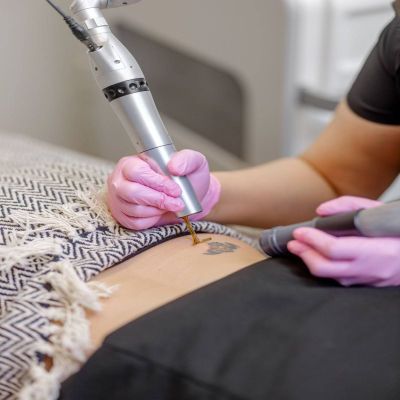Laser tattoo removal has become a popular method for those seeking to erase unwanted ink. However, for individuals with dark skin, some unique considerations and risks must be carefully managed. Finding the Best Laser Tattoo Removal Clinic in Muscat is crucial for minimizing these risks and achieving optimal results. This article explores the potential risks associated with laser tattoo removal on dark skin and guides how to navigate these challenges effectively.

The Importance of Choosing the Best Laser Tattoo Removal Clinic in Muscat
When considering laser tattoo removal, particularly for darker skin tones, selecting the right clinic is of utmost importance. The best laser tattoo removal clinic in Muscat will have the expertise and advanced technology needed to address the specific needs of darker skin. Proper equipment and experienced practitioners are essential for minimizing risks and achieving the best possible outcomes.
Key Factors in Choosing the Right Clinic
- Experience and Expertise: Ensure that the clinic has experience working with dark skin tones and understands the unique challenges involved.
- Technology and Equipment: Look for clinics that use advanced laser technology specifically designed for various skin types.
- Patient Reviews and Testimonials: Research feedback from previous patients with similar skin types to gauge the clinic’s effectiveness and safety.
Risks of Laser Tattoo Removal on Dark Skin
Laser tattoo removal on dark skin presents several potential risks, which can vary depending on the skin type and tattoo characteristics. Understanding these risks can help you make informed decisions and take necessary precautions.
Hyperpigmentation and Hypopigmentation
One of the primary risks associated with laser tattoo removal on dark skin is the potential for hyperpigmentation (darkening of the skin) or hypopigmentation (lightening of the skin). These conditions occur when the laser treatment affects the skin’s pigment cells, leading to uneven skin tone.
- Hyperpigmentation: This is a common issue where the skin becomes darker in the treated areas. It is more likely to occur if the skin is not properly protected or if the laser settings are not adjusted for darker skin.
- Hypopigmentation: This occurs when the skin loses pigment, resulting in lighter patches. It can be more challenging to treat and may be permanent in some cases.
Scarring and Skin Texture Changes
Scarring and changes in skin texture can also be a concern. Dark skin is generally more prone to scarring, and the removal process can sometimes exacerbate this issue.
- Keloid Scarring: Individuals with dark skin may be more susceptible to keloid scars, which are raised and thickened areas of scar tissue that can form after skin injury.
- Textural Changes: The skin’s texture may become uneven or rough, especially if the laser treatment is not performed correctly.
Risk of Burns and Blisters
Burns and blisters are potential risks with any laser treatment, but they can be particularly problematic for darker skin tones. The risk of burns is heightened if the laser settings are too strong or if the skin is not adequately protected during the procedure.
- Burns: Improper laser settings or lack of appropriate cooling can lead to burns, which can be painful and may cause long-term skin damage.
- Blisters: Blisters may form as a reaction to the laser treatment and can result in additional complications if not treated properly.
Pre-Treatment and Post-Treatment Care
To minimize the risks associated with laser tattoo removal on dark skin, proper pre-treatment and post-treatment care are essential.
Pre-Treatment Care
- Consultation and Patch Test: Schedule a thorough consultation with a specialist who has experience with dark skin. A patch test may be performed to assess how your skin reacts to the laser.
- Avoid Sun Exposure: Protect your skin from sun exposure before the treatment to reduce the risk of pigmentation changes.
- Skin Preparation: Follow any recommended skincare routines or preparations advised by your clinic to ensure your skin is in optimal condition for the procedure.
Post-Treatment Care
- Follow-Up Care: Adhere to all post-treatment instructions provided by the clinic. This may include using specific creams or ointments to promote healing and reduce the risk of complications.
- Sun Protection: Continue to protect your skin from the sun, as exposure can exacerbate pigmentation issues and hinder the healing process.
- Monitor for Complications: Keep an eye out for any signs of adverse reactions, such as excessive redness, swelling, or unusual changes in skin color, and report them to your clinic promptly.
Alternatives to Laser Tattoo Removal for Dark Skin
For some individuals with dark skin, traditional laser tattoo removal may not be the most suitable option. There are alternative treatments that may be considered based on individual needs and skin conditions.
Chemical Peels and Dermabrasion
Chemical peels and dermabrasion are alternatives that can be used to address tattoo removal, though they also come with their risks and considerations.
- Chemical Peels: These involve applying a chemical solution to the skin to remove the outer layers. They may be less effective on tattoos and require careful consideration for darker skin tones.
- Dermabrasion: This technique involves sanding the skin to remove the tattoo. It can be effective but may lead to scarring or changes in skin texture.
Tattoo Lightening Creams
Tattoo lightening creams are topical treatments that can help fade tattoos over time. They may be a less invasive option but generally require a longer period to see results and may not be as effective for all tattoo colors or skin types.
Conclusion
Understanding the risks of laser tattoo removal on dark skin is essential for anyone considering this treatment. By choosing the best laser tattoo removal clinic in Muscat and taking appropriate precautions, you can minimize these risks and achieve better results. Always consult with a qualified specialist to discuss your specific needs and explore the best options for your skin type.
